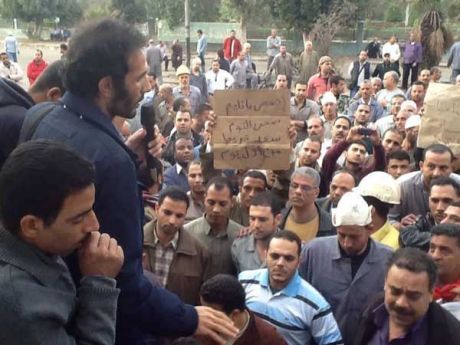Shared
You are here
Egypt's Revolution deepens in the face of state repression

December 18, 2013
Egyptian Revolutionary Socialist and labour lawyer Haitham Mohamedain is a leading activist in the struggles against the military’s new “protest law”. He writes from Cairo on why this resistance shows that the revolution continues.
The revolutionary groups that called for, organised and participated in the Revolution of 25 January with the Egyptian masses are still mobilised. They are keeping alive the slogans of the revolution and calling for the realisation of its goals of bread, freedom and social justice. They have fought against Hosni Mubarak’s regime, and the Military Council, so that every month of the year now brings with it the memories of revolutionary battles and mass uprisings.
The latest of these uprisings came on 30 June this year. The uprising would have happened whether the revolutionary forces took part or not, as the presidency of the dictator Mohamed Mursi had witnessed the greatest mass protests in the world. During March, April and May this year Egypt occupied the number one position in the rates of global protest, with two protests taking place every hour. Most of these were labour and social protests against policies similar to those pursued by Mubarak.
The Muslim Brotherhood regarded these protests as a “conspiracy to overthrow Mursi”, and responded by raising their battle cry—meeting mobilisation with counter-mobilisation. They did not understand at all that the mood of the masses had changed. They had won partial support of the masses in the elections reflecting the hopes and aspirations for change which the Brotherhood had promised.
This change was a mirage and hopes and aspirations turned into a state of anger which swept the country on 30 June. The movement was full of contradictions. There were the workers and the poor, who wanted to improve their social conditions, and rejected the continuation by the “Mursi Mubarak” regime of policies which entrench social inequality.
Then there were the young revolutionary activists who found themselves in an unenviable position. They were between an immense, powerful mass movement on the one hand and on the other faced the apparatus of the state and Mubarak’s cronies. They, led by the right-wing camp (the army and police and the bosses), sought to hijack the revolutionary wave and keep the anger of the masses directed solely towards the Brotherhood.
Because of the absence of a revolutionary party, and a mass revolutionary front, the institutions of the state succeeded in assuming the political leadership of the masses. And on 3 July, the military announced officially that it was taking the reins of power.
Frustration
This movement saw some frustrating scenes. Police officers, enemies of the revolution, were being carried shoulder-high by Mubarak’s cronies, and some were deceived by their apparent “repentance” and their claim to be on the side of the people. The revolutionary forces hit a wave of frustration and confusion.
This state of frustration and confusion increased with the massacres committed by the military at Raba’a al-Adawiyya, Al-Nahda Square, Ramsis and outside the Republican Guard Headquarters.
Slogans began changing before our eyes. “Bread, Freedom and Social Justice” became “War on Terror”. “The people demand the downfall of the regime” became “The army, police and the people are one hand”. “Revolutionaries, free people—we will complete our journey” became “Thanks for your 'mandate' to take power, now go home”
But the revolutionary groups began to shake themselves free of frustration, and to escape from stagnation. They announced their resistance to the plans of the counter-revolution led by general Abdel-Fattah al-Sisi. They set themselves the immediate goal of raising slogans and banners in the streets in the face of the general’s portraits and the posters for the “People’s police”.
They worked to loosen the grip of the fist of the military regime over the streets and squares of the revolution. The army had sent tanks to occupy the streets and muffled all voices, except for those praising the leader, or “mandating” him to murder.
Confidence
The revolutionary forces once more moved towards the road of the revolution and went out into the street. They managed to demonstrate in front of the Supreme Court against Mubarak’s release from prison. They launched a demonstration to Maspero to commemorate the military’s massacre of the Copts. For the first time since 3 July these places rang with chants against military rule.
After these events, the youth movements began to recover their self-confidence. They mobilised to commemorate the uprising in Mohamed Mahmoud Street. For two days they were able to raise the voice of the revolution and its flags once again in Abdin Square, Mohamed Mahmoud Street. They reached the square of the revolution, Tahrir Square, for the first time since the 3 July and drove out Al-Sisi supporters and raised the banners of the martyrs.
This raised the revolutionaries’ morale significantly, and the state’s rabid campaign faltered. These mobilisations have caused a state of confusion, albeit limited, in the ranks of the ruling military-liberal alliance.
But they quickly papered over the cracks and announced that they were declaring open war against anything that represented the revolution, and anyone who raised its slogans and mobilised in the streets, on the campuses and in the factories. They issued the “law to prevent demonstrations”, and gave the green light to the Minister of the Interior to exercise repression, using this law to brutally smash revolutionary protests and rallies, student demonstrations, and workers’ sit-ins and strikes. They think that this way they can stop the mass movement which is rising day by day and growing in strength and determination in the face of the ruling regime’s arrogance and oppression.
If you want to end the revolution, we promise you that we will continue it. We tell you that your prisons are much too small for the revolutionary masses of Egypt. The revolution of 25 January continues.
This is republished from Socialist Worker (UK).
Section:









